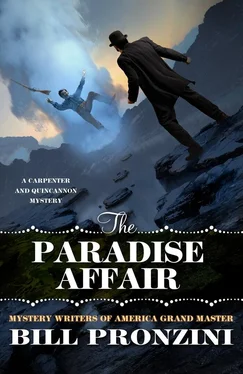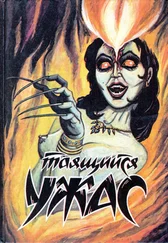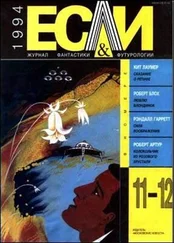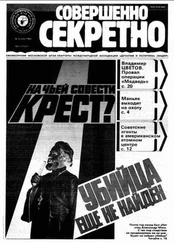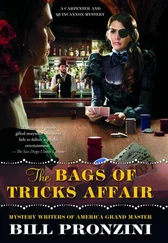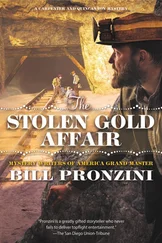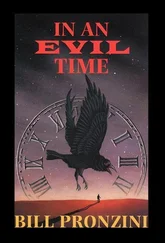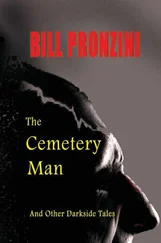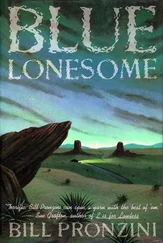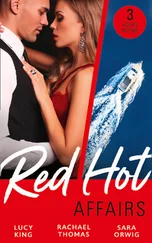Sam Opaka brought his carpetbag, handed it over, and departed without a word. Quincannon couldn’t tell if the bag had been searched, not that it mattered a whit if it had; it contained nothing of value or pertinence to his investigation. With a basin of water and a bar of lye soap supplied by Mele he scrubbed a layer of volcanic dust off his face, hands, and beard, then changed into fresh clothes for dinner.
The meal was served by lamplight on the lanai. Home-grown beef, rich and tender, which he ate mechanically, without enjoyment. He and Grace Millay were the only diners. Her brother, she explained briefly, was “not feeling well” (an obvious euphemism) and preferred to remain in his room. As they ate, she questioned him briefly about his profession but made no further mention of his pursuit of the two swindlers. The remainder of their somewhat strained conversation was on neutral topics.
After dinner he declined the offer of brandy and returned to the makeshift guest quarters. He stretched out on the bed fully dressed, the Navy Colt beside him and his ears cocked, and forced himself to remain awake and alert for any sign of danger. The vigil was groundless. There was no incident of any kind.
An hour past midnight, he rose and went to the door to reconnoiter. The night was silent, the ranch grounds empty as far as he could see, the sky filled with enough scudding clouds to keep moonlight to a minimum. No lights showed in the main house; a dull lantern gleam in a bunkhouse window was the only light to be seen.
He slipped out, made his stealthy way around past the cattle pens and dairy barn. The stable lay ahead to his right, but as he neared it the door to the bunkhouse opened, shedding a swath of lantern light and then a pair of paniolos . The hired wagon, fortunately, had been drawn near the corral fence; Quincannon ducked low into the shadows behind it, just in time to avoid being seen. He crouched there while the two cowboys rolled and smoked cigarettes. They took their confounded time doing so; his sacroiliac had begun to ache by the time they finished and went back inside. Straightening, he swallowed a grumble, stretched the kink out of his spine, and hurried on to the stable.
The doors were shut; carefully, so as not to make any noise, he parted the two halves, eased through, pulled them closed behind him. Horses and the Kona nightingale moved restlessly in their stalls when he scraped a lucifer alight. That one match was all he needed to locate a lantern hanging from a nail near the door.
He took it down, shook it to be certain the reservoir was full. Then, wrapped in shadow again, he drifted back out to the hired wagon and secreted the lantern inside the box beneath the seat.
Quincannon was up and on his way shortly after first light.
The ranch had already stirred to life. Paniolos and other hirelings moved in and around the barn, corral, and cattle pens; none of them paid any attention to him. Stanton and Grace Millay were nowhere to be seen; neither was Sam Opaka. Quincannon found the cowhand he had spoken to yesterday, Keole, in the stable and together they brought the Kona nightingale out and harnessed it in the rented buggy’s traces.
There was still no sign of the Millays by the time Quincannon drove out of the ranch yard. Just as well. Farewells were unnecessary; they would be as glad to see him gone as he was to leave.
Rolling, dark-veined clouds obscured most of the towering slopes of Mauna Kea. They thickened and seemed to follow him, hiding the rising sun, as the donkey clattered him along the ranch road. Once he saw a lone rider far off among the cattle grazing on an upper valley slope. Otherwise he had the road and the morning to himself.
By the time he neared the ocean the sky was a mass of dark-edged cumulus clouds that obliterated the sun. The muggy kona heat was already on the rise; that, the restive cloud cover, and the wind that blew in fitful gusts here and carried the smell of ozone, threatened the arrival of a new storm. The prospect goaded him into venting an epithet that made the donkey’s ears twitch. But the threat had yet to be fulfilled when he reached the intersection with the Kailua road. With luck, the downpour would hold off long enough for him to complete the task he had set for himself.
The road was deserted; he saw no one anywhere, heard only the thrum of the wind and the sullen mutter of the whitecapped sea. He drove to the heiau, tethered the Kona nightingale to the same stunted tree as the day before, then removed the lantern he had appropriated from beneath the buggy seat. He considered donning the rain slicker that the charitable Kailua liveryman had rolled inside the box, decided against it. Even if the storm broke while he was prowling among the rocks below, he would be better off unencumbered by an extra garment.
He had no trouble finding the ancient trail this time. He made his way down to the ledge above the beach. The offshore wind beat at him, stinging his face with spray from the breaking waves. The blowhole muttered and spouted, but its geysers did not seem to be as high-flung as the ones yesterday.
The broken outer walls of the heiau provided some shelter as he moved into the ruins. The first of the openings he’d discovered on his previous visit led him, after a dozen yards, into a cul-de-sac of broken, sharp-edged lava rock. The second wound deeper among the massive stones, twisting so that Quincannon had to light the lantern in order to mark his progress, but it soon narrowed until he was unable to fit his body into the slit. Two more passages proved to be blocked and empty as well.
The fifth, at the far end of the arrangement of flat volcanic slabs, had a tight, half-hidden opening. The entrance to the inner recesses of the heiau, he judged, partially concealed by reaching fingers of molten lava from a long-ago volcanic eruption. The space was so narrow that he had to suck in his belly and squeeze through sideways.
After a short distance he was able to walk freely again. This was not a completely natural passage, but one that had been widened and carved through the rock at a sharpening downward angle. Its floor had been worn smooth by water seepage; twice Quincannon slipped on the slick surface and nearly lost his balance. The walls were spotted with some kind of moss that crumbled when he brushed against it. The ceiling lowered as he went, so that he was forced to bow his body and move in an awkward waddle.
He had gone more than fifty rods when the slant lessened and the passage ended in a cave-like opening that led into what must be an ancient lava tube. The seaward end was choked off by a jumbled wall of rock, but the section that curled back inland appeared clear. Here it was cool and dry. The lantern’s light glinted off a glass-smooth black floor; off streaks of color in the surrounding rock that must be earth minerals carried along by the lava flows and solidified among them.
After a short distance the tube grew clogged again, apparently with the residue of more recent flows, and at first he thought he’d stumbled into another cul-de-sac. Then, passing around one of the boulders, he encountered a slender continuation of the tube. He had to crawl a short way on hands and knees, muttering to himself, all but nosing the lantern ahead of him like a kid engaged in a peanut-rolling contest, before it widened again.
Here, hanging stalactites and jutting stalagmites obstructed his progress. One of the former gouged his neck in passing and earned itself the same colorful name that had made the Kona nightingale’s ears twitch. The tunnel narrowed, curved, rose slightly, then once more widened, this time to merge with another, larger tube.
No sooner had he entered this one than a faint current of warm, fresh air tickled his nostrils.
Читать дальше
